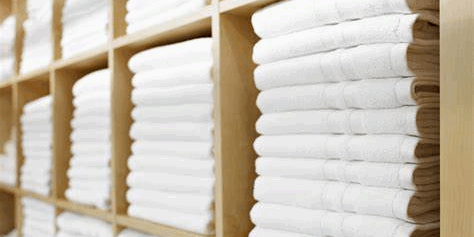Smarter Laundry Begins with RFID
In industries where laundry management is mission-critical—such as hospitality, healthcare, and industrial services—the traditional barcode or manual tracking systems are rapidly becoming obsolete. The RFID industrial laundry tag offers a robust, contactless solution for tracking textiles, increasing operational efficiency, and reducing loss.
Whether it’s tracking thousands of hotel towels or ensuring surgical gowns are properly cleaned and returned, RFID tags designed for laundry applications are changing the way businesses handle fabric assets.
What Is an RFID Industrial Laundry Tag?
An RFID industrial laundry tag is a specially designed RFID tag that can withstand the harsh conditions of industrial laundering—extreme temperatures, high water pressure, chemical detergents, and mechanical stress. These tags are sewn, heat-sealed, or embedded into linens, uniforms, and other washable textiles.
RFID tags use radio waves to transmit data to RFID readers. Each tag contains a unique identifier and can be encoded with additional information such as item type, laundry cycle count, ownership, or location.
Key Features of RFID Laundry Tags
Heat & Chemical Resistance: Withstand temperatures up to 200°C and resistant to alkalis and acids.
Durability: Last through more than 200 washing and sterilization cycles.
Small & Flexible Form Factor: Available in woven label, silicone, or button formats.
Long Read Range: Especially for UHF tags, read distances of 2–5 meters are typical.
High Read Speeds: Bulk reading of hundreds of items in seconds.
Main Applications of RFID Industrial Laundry Tags
- Hospitality Industry
Hotels, resorts, and spas handle thousands of items daily, from towels to linens. Manual tracking leads to:
Item misplacement
Time-consuming inventory counts
Difficulty verifying laundry vendor billing
RFID Solution: Tags are sewn into items; readers at laundry exit/entry points track every asset. Integration with hotel ERP systems allows real-time inventory management.
- Healthcare & Hospitals
Hospitals require sterilized uniforms, sheets, and surgical gowns. Ensuring these are cleaned, tracked, and reused safely is crucial.
RFID Enables:
Hygiene tracking logs (when/who washed)
Isolation of contaminated garments
Regulatory compliance (e.g. ISO, JCI)
- Industrial Workwear
Factories, oil & gas companies, and chemical plants issue protective workwear that must be washed, inspected, and rotated.
Use Cases:
Worker uniform assignment
Garment usage history tracking
Preventive maintenance scheduling
- Laundry Service Providers
Third-party industrial laundries service multiple clients and need to:
- Prevent cross-contamination
- Track customer-owned inventory
- Automate sorting and billing
RFID enables:
- Automatic client identification
- Smart sorting machines
- Billing based on actual usage
Benefits of RFID Laundry Tag Implementation
| Benefit | Explanation |
|---|---|
| 💡 Real-time Tracking | Know where each item is in the cycle |
| 📉 Loss Prevention | Reduce loss or theft of valuable textiles |
| 📈 Increased Efficiency | Bulk scanning saves labor and time |
| 📊 Data Analytics | Insights into wash cycles, asset lifespan |
| 🤝 Client Trust | Transparent billing and item tracking |
Case Study: RFID Laundry in a Luxury Hotel Chain
A 5-star hotel group introduced UHF RFID industrial laundry tags across 10 properties. Within 3 months:
Linen loss reduced by 23%
Sorting time dropped from 3 hours to 20 minutes
ROI achieved within 6 months
Common Questions
Q: Will tags survive drying and ironing?
A: Yes. Most tags are tested for extreme thermal and mechanical stress.
Q: Can I track individual usage?
A: Yes. Each tag can be assigned to a unique user or location.
Q: Is RFID better than barcode?
A: For laundry, yes—RFID allows bulk, non-line-of-sight reading.
Conclusion
The RFID industrial laundry tag is no longer a future innovation—it’s a proven, cost-effective tool for textile tracking. Whether you’re running a hospital, managing a luxury hotel, or providing industrial laundry services, integrating RFID means better control, less waste, and happier clients.
📌 Smart textiles deserve smart tracking—RFID industrial laundry tags deliver exactly that.






